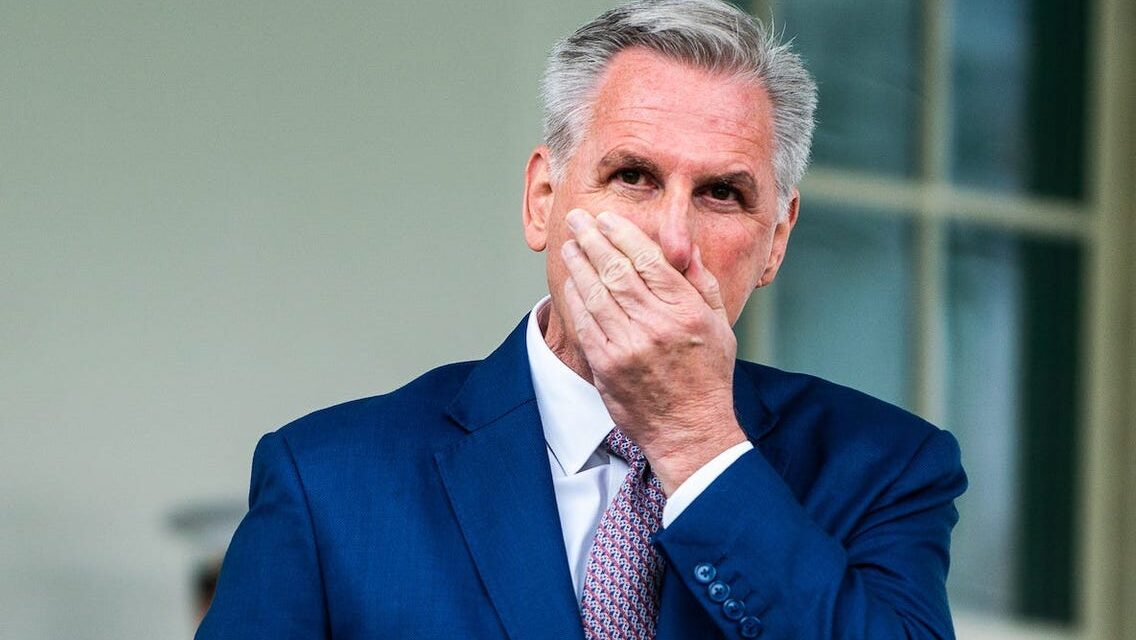The last time I really bothered to write about Kevin McCarthy and the debt ceiling was on January 2, 2023 in a post titled Kevin McCarthy Has Already Lost. It was on the eve of the California lawmaker’s bid to win the Speakership, which he would only secure on January 7th after four days and 15 roll call votes. It was already evident on the 2nd that McCarthy had acceded to a rules package allowing a mere five members of the House to force a vote on ousting the speaker. As it turned out, that wasn’t good enough. In order to secure the votes he needed on the 7th, he granted a rule allowing a single member to force such a vote.
One of the key concessions made by Republican Leader Kevin McCarthy in his bid to be House speaker was to restore the ability of a single member to call for a no-confidence vote in the speaker, a provision he opposed early this week, but one he agreed to on Wednesday to win over the most conservative members of the GOP conference.
The demand by the Republican holdouts would restore the House rule on vacating the chair to what it was before Rep. Nancy Pelosi was elected speaker in 2019. Under Pelosi, a motion to vacate could be offered on the House floor only if a majority of either party agreed to it.
But even at the five member threshold, I knew McCarthy had a major problem that would likely doom him.
In one sense, McCarthy has already lost because making it so easy to oust the Speaker makes it impossible for him to do his job. Even if he somehow secures the gavel on Tuesday, he won’t be able to keep it. He’ll either get bounced by right-wing radicals for paying America’s debts and funding its agencies or he’ll get bounced by the vast majority of the House for refusing to do those things and causing a global depression.
At the time, I was arguing rather strenuously that the true majority in the House wasn’t Republican but rather a bipartisan coalition of members who would be willing to pay the government’s debts on time and avoid intractable budget impasses that lead to government shutdowns. I suggested repeatedly that we skip to the chase, and rather than go through all the drama we’re seeing play out now, this true majority should come together and elect a suitable Speaker who would and could represent their interests. I said it was likely that this majority would eventually exert itself, but perhaps not before a catastrophic debt default.
The same problem will face any other Republican Speaker who relies on support from the far right for their majority. This is why we may actually see a bipartisan majority caucus emerge in the House. It could happen preemptively, to avoid obvious looming catastrophes, but it will more likely come down the line in response to catastrophe. There is a ton on the line, and it will be quite the show.
As I saw it, I had laid everything out in this January piece and other ones preceding it in December, and I didn’t have anything more worth saying about the debt ceiling. Would McCarthy eventually strike a deal with the Biden administration to avoid default? Should the administration make concessions? What would be a good deal or a bad deal? None of that interested me, because I knew that the basic facts remained the same. McCarthy could not agree to any deal that would be acceptable to the administration without triggering a motion to vacate the chair. The drama would then come in two steps.
- What decision would McCarthy make? Would he risk his Speakership to do the responsible thing, and knowing he’d need Democratic votes, would he do it in time to prevent a disaster for the country’s credit rating?
- Would he accept Democratic support to keep his Speakership, and what conditions would the Democrats require in return?
It appears we have the answer to question number one. Speaker McCarthy will risk his gavel to pay our debts on time, with a vote now scheduled for Wednesday. That means we will soon begin talking about question two. CNN is reporting on-air that Rep. Chip Roy of Texas will make a motion to vacate the chair. If Rep. Roy follows through on that threat, McCarthy will almost certainly not retain his Speakership without the help of at least a handful of Democratic members. There are currently 222 Republican members of the 435-member U.S. House of Representatives, meaning that a Speaker needs 217 votes to prevail on a challenge to their leadership.
Back in January, I wondered why McCarthy was fighting so hard to win a position he probably couldn’t keep. I suspect we’re about to get back to approximately the same situation McCarthy faced then. He was unable to secure the majority he needed until he made untenable (and sometimes secret) promises to Rep. Roy and other members of the Freedom Caucus. He’s in the process of breaking some of those promises now, which was inevitable if he intended to be even minimally competent and responsible.
On a motion to vacate the chair, the Democrats are likely to vote in favor. Once the Speakership is vacant, the Democrats will vote for their leader, Hakeem Jeffries of New York. If McCarthy wants to keep the gavel, he will need to offer the Democrats something very valuable, including at a minimum a reshuffling of committee assignments and chairmanships that gives the Democrats more power.
In September 2015, when then-Speaker John Boehner faced a similar challenge, he quit.
Today, Speaker John Boehner (R-Ohio) announced to House Republicans that he is retiring from Congress at the end of October. Boehner, now in his fifth year as Speaker of the House, faced a challenge no other House Speaker had faced in over a century: A Motion to Vacate the Chair spearheaded by a small, conservative group inside his own Republican Causes and led by Congressman Mark Meadows, a second-term Member from North Carolina.
In Boehner’s case, the triggering event was a demand by the Freedom Caucus that he force a government shutdown if Planned Parenthood wasn’t completely defunded, which has just another in a long serious of demands that he wage battles it was impossible to win. He could have gone to the Democrats to win some support on the motion to vacate, but he wasn’t willing to make the necessary concessions and put up with the resulting vitriol from his own party and its supporters.
Maybe McCarthy’s desire to keep the gavel will lead him to a different calculation. Maybe he can head off the motion somehow before it is made, although I don’t know if having broken his previous promises to the Freedom Caucus, there’s anything he can do to forestall their challenge now.
Before we get to all this, though, we first have to see if McCarthy can actually get the deal passed in the first place. That’s not a certainty given his record of flailing and failure.







